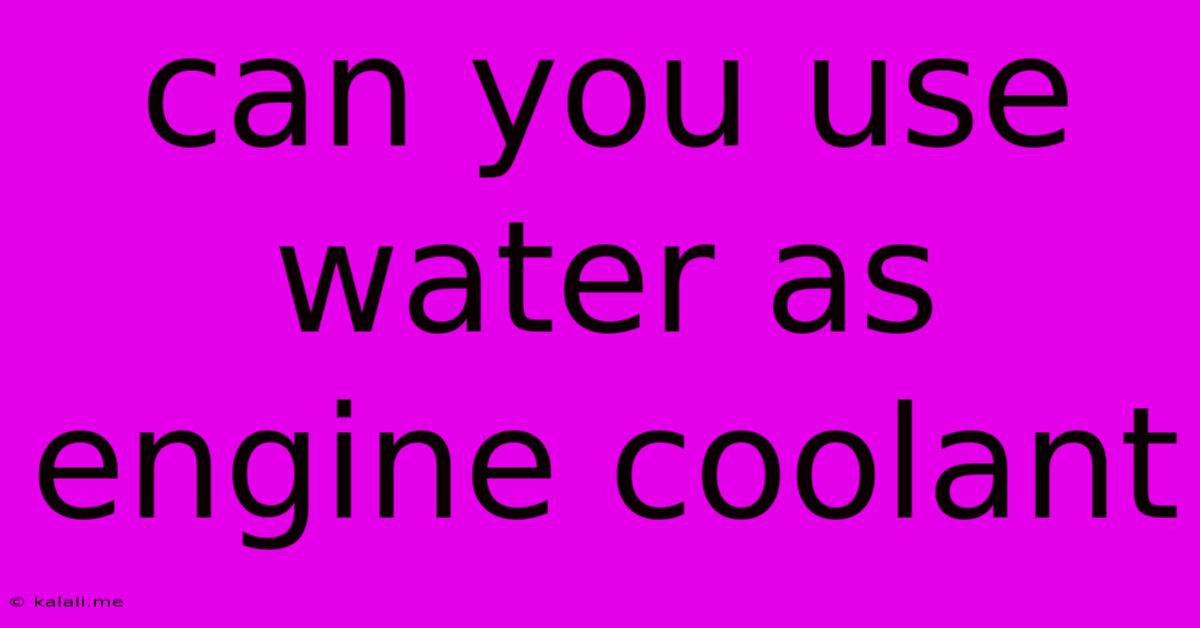Can You Use Water As Engine Coolant
Kalali
May 19, 2025 · 3 min read

Table of Contents
Can You Use Water as Engine Coolant? A Comprehensive Guide
Meta Description: Considering using water as engine coolant? This guide explores the pros, cons, and risks of using water instead of dedicated coolant, helping you make an informed decision for your vehicle's engine.
Using water as engine coolant might seem like a cost-effective solution, especially in a pinch. However, it's a decision fraught with potential problems that can significantly damage your vehicle's engine. While water can temporarily cool an engine, it's far from an ideal or long-term solution. This article will delve into the reasons why, exploring the critical differences between water and commercially available engine coolants.
Why Dedicated Coolant is Essential
Modern engines operate under immense pressure and generate significant heat. A reliable coolant system is crucial to prevent overheating, which can lead to catastrophic engine failure. Dedicated coolants are formulated to handle these extreme conditions, offering several advantages that water simply cannot match:
-
Corrosion Inhibition: Water is highly corrosive, especially when exposed to high temperatures and the various metals within your engine block (aluminum, iron, etc.). This corrosion leads to rust, scaling, and ultimately, engine damage. Coolants contain corrosion inhibitors that protect these components, extending the lifespan of your engine. This is a key difference – water lacks this crucial protection.
-
Freezing Point Depression: Water freezes at 0°C (32°F). In freezing temperatures, expanding ice can crack engine blocks and hoses, resulting in costly repairs. Coolants contain antifreeze, typically ethylene glycol or propylene glycol, lowering the freezing point to well below 0°F, protecting your engine from freeze damage.
-
Boiling Point Elevation: Coolants also have a higher boiling point than water. This prevents the coolant from boiling and creating vapor pockets, which can impede efficient heat transfer and lead to overheating. Water boils at 100°C (212°F), significantly lower than the operating temperatures of many modern engines.
-
Heat Transfer Efficiency: Coolants are designed for optimal heat transfer. Their chemical composition and additives enhance their ability to absorb and dissipate heat more effectively than water alone.
-
Lubrication: Some coolants provide a degree of lubrication for the water pump, reducing wear and tear on this critical component. Water lacks this lubricating quality.
The Risks of Using Water as Coolant
Using water instead of dedicated coolant carries significant risks:
-
Corrosion and Rust: As mentioned, water's corrosive nature will rapidly degrade engine components. This can lead to leaks, blockages, and ultimately, engine failure.
-
Freeze Damage: In cold climates, using only water will almost certainly result in freeze damage to the engine block, radiator, and hoses.
-
Overheating: Water's low boiling point makes it prone to boiling over, leading to overheating and potential engine seizure.
-
Cavitation: Vapor pockets in the cooling system due to boiling can cause cavitation in the water pump, leading to damage and eventual failure.
Temporary Use in Emergencies
While using water as a coolant is generally discouraged, there might be rare emergency situations where it's a necessary short-term solution to get to a repair shop. However, this should only be done as an absolute last resort, and the vehicle should not be driven for extended periods. Even then, remember to refill with proper coolant as soon as possible.
Conclusion
While water may seem like a cheaper alternative, the risks associated with using it as engine coolant far outweigh any potential cost savings. Dedicated engine coolants offer vital protection against corrosion, freezing, and overheating, ensuring the longevity and efficiency of your engine. Always use the manufacturer's recommended coolant type and follow the proper maintenance schedule to keep your engine running smoothly. Ignoring this can lead to significant and costly repairs.
Latest Posts
Latest Posts
-
Which Battery Terminal To Connect First
May 19, 2025
-
Can You Drink Tap Water In Greece
May 19, 2025
-
Looking Forward To Hear From You Or Hearing
May 19, 2025
-
What Is The Difference Between The
May 19, 2025
-
Can I Use Hot Chocolate Instead Of Cocoa Powder
May 19, 2025
Related Post
Thank you for visiting our website which covers about Can You Use Water As Engine Coolant . We hope the information provided has been useful to you. Feel free to contact us if you have any questions or need further assistance. See you next time and don't miss to bookmark.